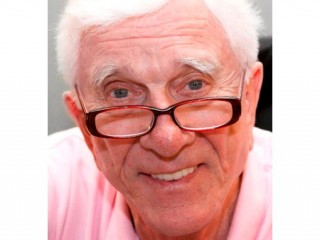
Samuel T. Cohen biography
Date of birth : 1921-01-25
Date of death : 2010-11-28
Birthplace : Brooklyn, New York, United States
Nationality : American
Category : Science and Technology
Last modified : 2011-09-29
Credited as : physicist, miniature nuclear weapon,
0 votes so far
He said he conceived of the neutron bomb after visiting Seoul in 1951, while that city was largely in ruins following the Korean War. First proposed in 1958 and technically titled the W70 tactical nuclear warhead, the neutron bomb offers a blast and heat wave about one-tenth that of a "normal" nuclear bomb, with an expedited but more controlled release of neutrons that destroy the central nervous system of any living thing in the vicinity. These neutrons, however, pass through vehicles, buildings, and other inanimate objects and dissipate almost immediately after the blast, theoretically leaving most of the buildings and other infrastructure of civilization undamaged and still habitable.
Though Cohen's neutron bomb was sometimes criticized for bringing human death while sparing real estate and property, its inventor believed that it was - at least by the standards of warfare - a humane, moral, and sane alternative to the more deadly and destructive full-scale nuclear weapons. "When the war is over," Cohen explained, "the world is still intact".
For decades, Cohen sought unsuccessfully to have tactical neutron weapons added to the US arsenal. Rejected by the Kennedy, Johnson, Nixon, and Carter administrations, hundreds of neutron bombs were finally constructed during the presidency of Ronald Reagan. The scheduled installation of neutron bombs across Europe was canceled, however, amid protests from peace activists, and during the administration of George H.W. Bush the US stockpile of neutron weapons was dismantled. The governments of China, France, Israel, and Russia are also believed to have built neutron bombs, but tactical nuclear weapons are not known to have ever been used in warfare.
















